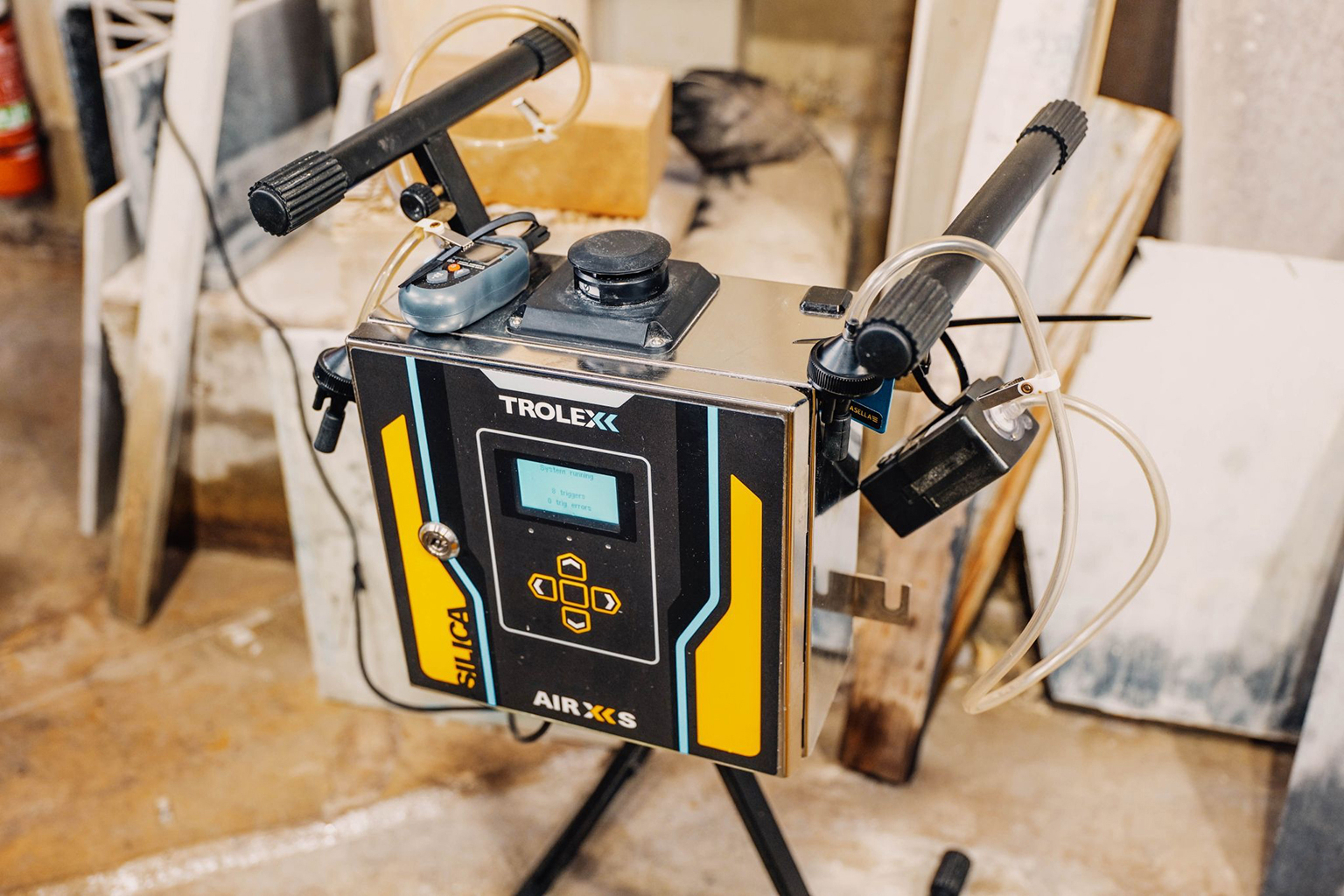By the end of May or early June, SiG (Stone Industry Group) should have a device for sale that measures levels of respirable crystalline silica in the air accurately in real time.
The device is called Trolex Air XS, and is said to be more than twice as accurate as the X-Ray defraction units that are currently used to measure RCS levels as well as providing instant readings.
The unit was introduced to members of the Worktop Fabricators Federation at their meeting at machinery company Intermac’s premises in Northamptonshire last year, when volunteers were asked to carry out field trials.
The development of the unit by British company Trolex is now almost complete. It will be sold in the stone industry by SiG, in the UK and also in America and Europe.
It was introduced to the Americans this month (February) at StonExpo/Marmomac, part of the International Surfaces Event held in Las Vegas. It won the ‘Best of Technology 2022’ award at the exhibition.
Among those manning the exhibition stand in Las Vegas was Ash Butler, who has now joined SiG and will be selling the Trolex Air XS in the UK.
In America, concerns about silicosis and lung cancer resulting from exposure to RCS are even greater than they are in the UK, due in part to the level of claims that can be made by employees who end up with a disease.
In the USA the permitted workplace exposure level to RCS is half the current level in the UK, although the All-Party Parliamentary Group for Respiratory Health (APPG) said in its 2020 report Silica – the next asbestos? that the UK level should be reduced to the American level. The Group is currently reviewing that recommendation (read more about that here).
Cutting sandstone masonry in a British factory.
In the British sandstone industry the risk from RCS is taken seriously and people are routinely protected by substantial PPE, including positive pressure helmets. SiG is planning to introduce a positive pressure helmet to its range, having discovered one developed during the coronavirus pandemic to protect key workers from the Covid virus. It is particularly effective but lightweight for comfortable use over sustained periods.
At worktop fabricators in the UK, protection often involves no more than a mask over the mouth and nose that might or might not fit properly and be worn regularly by the operator, even though granite and engineered quartz typically produce high levels of RCS when worked. Even when worked wet, RCS will float in air-born water droplets that can be inhaled.
The sunlight exposes the level of water-born dust in this worktop fabricator's workshop in the USA.
HSE tests have shown air-born levels of RCS can exceed legal exposure limits outside as well as inside CNC machine enclosures. Using angle grinders, wet as well as dry, also produces RCS levels in the air well above legal limits.
“In the USA fabricators are putting warning stickers on slabs saying there’s an inherent risk of silicosis from handling and cutting this material,” says SiG Director Simon Bradbury.
He says in the UK the Health & Safety Executive is getting ever more vigilent about dust in general and RCS in particular because RCS is the biggest dust danger to construction workers after asbestos.
The Trolex Air XS is mobile, so can be used to test the RCS levels in different areas of a factory.
It has a price tag of just under £10,000, but Ash Butler says if companies look on it as an investment to protect themselves from injury claims by employees, as well as helping to protect employees from exposure to potentially lethal dust, it does not seem too high a price to pay.
SiG Director Simon Bradbury, SiG Inc President Jerry Van Der Bass and Ash Butler, who has recently joined SiG and will be selling the Trolex Air XS in the UK, receiving the 'Best of Technology Award' at the International Surfaces Event in Las Vegas earlier this month. Ash said the Air XS received the award because the judges could see where the industry is going in terms of the need for proactive dust monitoring. He says the UK is only a few years behind the US.

